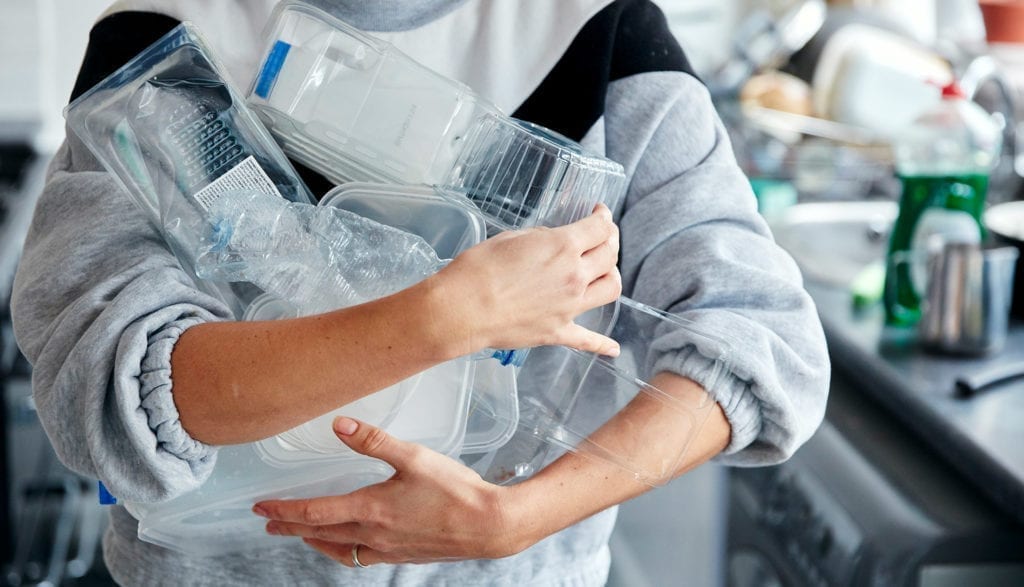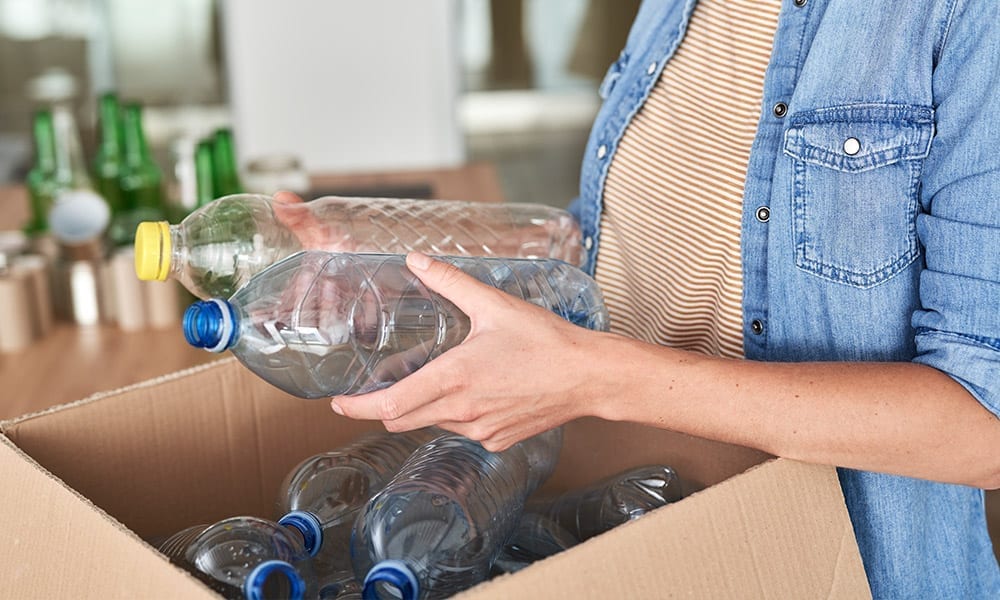What Do The Recycling Symbols Mean In Alberta?

Whether you’re new to Alberta, or you just want to get the low-down on what the rules around recycling actually are, we’re delighted to help you out.
There are a lot of rules and regulations about recycling in Alberta, which means it can be quite overwhelming/confusing trying to sort out your plastics, tins, and cans.
You’re just trying to do your bit for the planet! You’ve probably found yourself asking: ‘what plastics can I recycle?’ or ‘which plastics can’t be recycled?’ while sorting through sticky containers.
Well, we’re here to help you start recycling correctly to improve your carbon footprint, and avoid rooting through old plastics and cartons. So, today we’re going to go through all the recycling symbols in Alberta and help you understand some of the common recycling rules in Alberta.
Here’s what you should know for when you’re recycling plastics in Alberta.
What Are Resin Identification Codes?
Most modern plastics are recyclable. When recycled, these plastics can be made into new products. This reduces the amount of energy used to create new products.
Plastic as an overall material is challenging to recycle, so it has to be separated into plastics which are highly recyclable and those that aren’t recyclable.
Most plastics are marked with a Resin Identification Code. These symbols make it easy for plastic processors to keep the resin types (or polymers) separate from each other.
Thanks to these codes, recycling processors can easily control the quality of their products. This helps ensure that recycled plastics are put to good use.
In Alberta, we have outlets for all seven Resin Identification Codes. Separating these plastics when you’re recycling will stop contamination and make processing them into new products easier.

Take a look at this handy chart to figure out what symbol corresponds to your recyclables.
| PETE | HDPE | PVC | LDPE | PP | PS | Other |
| Bottles, containers | Bottles, containers, crates | Food containers | Bottles, containers, plastic bags | Stretch wrap | Containers, trays | Polycarbonate sheet, acrylic sheet |
You can find out more about Resin Identification Codes here.
What Does Each Resin Identification Code Mean?
Let’s take a closer look at what each of these Resin Identification Codes means.
1. PETE or PET (Polyethylene Terephthalate)
You should always recycle any plastic that has the number 1 symbol on it. Polyethylene terephthalate is the most common type of polyester and is accepted by the majority of recycling plants and curb-side pick-up services.
This polyester is found in water bottles, beverage containers, food containers, and other consumer bottles like shampoo bottles.
This plastic is strong, transparent, and considered safe for people. It is known however to accumulate bacteria if not cleaned properly. Remember to always clean your plastics before recycling them.
The great thing about PET or PETE packaging is that when it’s recycled it can easily be remade into more PET packaging and it can be recycled over and over again.
This polyester can also be recycled into material for carpets, t-shirts, and even dog beds.
2. HDPE (High-Density Polyethylene)
Number 2 can also be recycled easily as it’s a very commonly used plastic. It’s widely accepted by most recycling companies and curbside pickup companies.
It’s usually found in milk jugs, plastic bags, yogurt containers and some lawn and garden products.
This type of plastic is usually opaque in colour and is one of the plastics that’s considered safe to be used.
When you recycle high-density polyethylene you’re helping create brand new recycling containers, lumber, fencing, pens, and even fireworks.
3. V (Vinyl)
V, also known as PVC, is a plastic that isn’t usually picked up by curbside services and is one of the most synthetically-produced plastics.
It’s used mainly for drainage, sewage, plumbing, chemical storage, and food wrap.
When PVC is being produced it creates dioxins which are highly toxic and can damage immune systems and even lead to cancer. Dioxins are also produced when PVC is burned.
When PVC is dumped in a landfill it’s a huge waste of a resource as PVC is 100% recyclable. Plus, PVC products won’t degrade for hundreds of years, making them hazardous to our environment.
PVC can be recycled into loads of usable things like traffic cones, decking, fencing, and cables.
4. LDPE (Low-Density Polyethylene)
This plastic is usually found in children’s toys, carrier bags, food container lids, and shrink wrap.
This type of plastic is one of the plastics that are considered safe to humans but some roadside pickup services might not collect it. It’s found in a lot of consumer products and is recycled into panelling, garbage cans, and film plastic.
5. PP (Polypropylene)
One of the safest plastics that is used and it’s completely recyclable and widely accepted by curbside pickup companies.
PP is usually found in rope, carpet, stationery, lab equipment, and medicine bottles. It can be recycled into a variety of products including car battery cases, signal lights, and even plastic lumber.
6. PS (Polystyrene)
Polystyrene is not collected by roadside pickup companies as it’s a difficult plastic to recycle. It comes in two forms; solid plastic and styrofoam.
Polystyrene is non-biodegradable and takes hundreds of years to decompose. It can also cause potential health issues as it lets out harmful toxins when heated.
This type of plastic is commonly found in egg cartons, to-go cups, smoke detectors, and disposable paper plates. Styrofoam is also used as a packaging material in the form of packing peanuts.
Despite its toxicity, polystyrene can be recycled properly into plastic lumber and flower pots.
7. Other
This category was mostly designed for all the other plastics that don’t fit into the other sections.
These plastics are usually found in baby bottles, some water bottles, nylon products, sunglasses, and the occasional microwaveable dish.
Some recycling depots accept all numbers, but some might be more selective when it comes to materials. You should contact your local recycling program to get a list of the plastic products they accept before bringing your recycling to them.
At Sage Hill Bottle Depot, we accept drinking containers (anything you paid a deposit on and was purchased in Alberta). Some of the materials we accept for recycling include:
- Aluminum cans
- Clear plastic/PET
- Coloured plastics
- Cartons/Gable tops
- Glass
- Tetra
- Bi-metals
- Foil drink pouches
- Bags-in-a-box
If you’re confused and want to check if you can bring particular recyclables to the Sage Hill Bottle Depot, then give us a call or bring them along next time you’re recycling things, and our team will let you know.

What Plastics Can Be Recycled In Alberta?
In Alberta, you can recycle almost any type of plastic, but to figure out if you can or can’t recycle your plastic, take a quick look at the plastic for certain information.
Check to see if:
- There are any indications of a Resin Identification Code (1-7)
- There are any printed indications of what type of plastic it is (HDPE, PVC etc.)
If you can’t figure out what type of plastic it is, then bring it to your nearest depot, and they’ll be happy to tell you what it is and if you can recycle it.
The only problem you might run into when trying to recycle your plastics is discovering its post-consumer plastics. This type of plastic waste is often a mixture of polymers, meaning it’s more likely to be contaminated and recycling it would be less economical.
If you’d like to recycle your containers, bottles and other plastics at the Sage Hill Bottle Depot, there are a few items we can’t accept.
These include all blue bin items like:
- Glass jars
- Soup cans
- Cooking oils containers
- Laundry detergent containers
- Soaps and body wash containers
- Food containers
There are other recycling plants that will happily accept these items but we don’t recycle them here.
If you’re confused or need some help figuring out what plastics you can and can’t recycle then feel free to get in contact with our team today.
You can also pop down to the depot and we’ll let you know whether your plastic can be recycled here!
Related Posts
Top 10 Things You Didn’t Know About Bottle Recycling
Sorting Out The Facts You might feel like recycling is a small act but we think it’s a pretty noble…
Top 5 Reasons to Visit Sage Hill Bottle Depot
Caring for the Community since Day 1 Oh, hello recyclers and environmental enthusiasts of Calgary! If you’re looking for an…
Your Trusted Partner for Recycling Solutions in Calgary
Assisting Small Businesses With Commercial Recycling Have you been looking for dependable recycling services in Calgary? We’re here to expedite…



